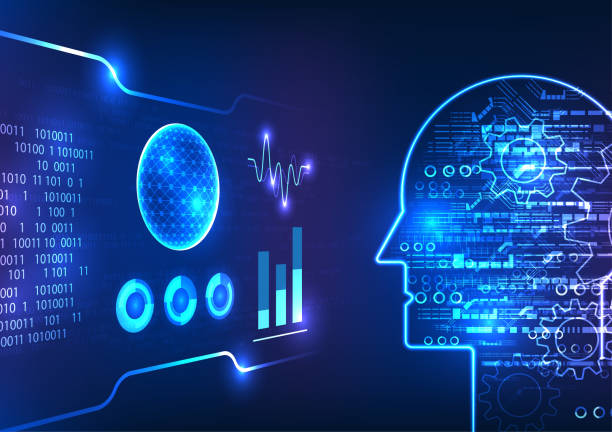What is Artificial Intelligence and what are its applications?

What is Artificial Intelligence and what are its applications?
#Artificial_Intelligence, or AI for short, is a branch of computer science that deals with building machines capable of performing tasks that normally require human intelligence.
These tasks include learning, problem-solving, pattern recognition, natural language understanding, and decision-making.
In simpler terms, artificial intelligence strives to enable computers to think and act like humans.
The applications of artificial intelligence are vast and diverse, affecting almost all industries and aspects of life.
Some of the most important applications of artificial intelligence include:
- Medicine: disease diagnosis, drug development, robotic surgery
- Automotive: self-driving cars, advanced driver-assistance systems
- Finance: fraud detection, risk management, algorithmic trading
- Marketing: advertising personalization, customer behavior analysis
- Education: smart learning systems, virtual tutoring
- Manufacturing: production line automation, quality control
- Security: facial recognition, smart video surveillance
Artificial intelligence is rapidly advancing and is expected to play a much larger role in our lives in the future.
This technology can help solve many complex problems and make our lives easier and more efficient.
To better understand artificial intelligence, studying Wikipedia can be helpful.
Are your online sales not as expected? With Rasawep, solve the problem of low sales and poor user experience forever!
✅ Increase visitor to customer conversion rate
✅ Create an enjoyable user experience and increase customer trust
⚡ Act now to receive a free consultation!
Types of Artificial Intelligence by Capability

Types of Artificial Intelligence by Capability
Artificial intelligence can be categorized into several types based on its capabilities.
This categorization helps us better understand the level of AI advancement and its future potentials.
- Narrow AI (or Weak AI): This type of artificial intelligence is designed to perform a specific task and performs very well in that task.
Most AI systems we interact with today are of this type.
For example, facial recognition systems, voice assistants like Siri and Alexa, and movie and music recommendation systems all use narrow AI. - General AI (or Strong AI): This type of artificial intelligence is capable of performing any task a human can.
In other words, general AI possesses human-like cognitive abilities and can learn and reason across various domains.
General AI is still in early stages of development, and no complete general AI system exists yet. - Superintelligence: This type of artificial intelligence surpasses human intelligence in all aspects.
Superintelligent AI can solve complex problems faster and better than humans and achieve significant scientific and technological advancements.
Superintelligent AI is still a theoretical concept and does not currently exist.
Currently, the main focus of AI research is on developing general AI.
Researchers are striving to design new algorithms and architectures that can give machines the ability to learn, reason, and problem-solve at a human-like level.
Machine Learning and its Role in Artificial Intelligence

Machine Learning and its Role in Artificial Intelligence
Machine Learning is one of the main subfields of #Artificial_Intelligence that enables computers to learn from data without explicit programming.
In essence, instead of being explicitly instructed on how to perform a specific task, the computer is fed data, and by analyzing this data, it learns existing patterns and relationships, using this knowledge for predictions or decision-making on new data.
Machine learning is divided into two main categories:
- Supervised Learning: In this type of learning, the computer is provided with a dataset that is labeled.
In other words, each data point is accompanied by a correct answer or outcome.
Using this data, the computer learns a model that can predict the correct answer for new data. - Unsupervised Learning: In this type of learning, the computer is provided with a dataset that is not labeled.
Using this data, the computer attempts to discover hidden patterns and structures within the data.
Machine learning plays a very important role in the development of artificial intelligence.
Many advanced AI systems, such as facial recognition, voice recognition, and language translation systems, use machine learning algorithms.
A deeper understanding of machine learning in this link might help you.
| Machine Learning Algorithm | Learning Type | Application |
|---|---|---|
| Linear Regression | Supervised | House Price Prediction |
| Decision Tree | Supervised | Fraud Detection |
| K-means Clustering | Unsupervised | Customer Segmentation |
Neural Networks and Deep Learning

Neural Networks and Deep Learning
Neural Networks are computational models inspired by the structure of the human brain.
These networks consist of many nodes called neurons connected to each other in layers.
Each neuron receives an input signal, processes it, and produces an output signal.
The strength and weight of connections between neurons determine how the neural network responds to different inputs.
Deep Learning is a subset of machine learning that uses deep neural networks with multiple layers.
These networks are capable of learning complex and abstract patterns from data and perform very well in various fields such as image recognition, natural language processing, and speech recognition.
Deep neural networks have made significant progress in recent years and have led to major successes in the field of #Artificial_Intelligence.
These networks are currently used in many applications, including:
- Self-driving cars: for object detection and decision-making on how to drive
- Voice assistants: for understanding voice commands and answering questions
- Language translation systems: for translating texts and conversations between different languages
- Facial recognition systems: for identifying people in images and videos
Deep learning is recognized as one of the most powerful tools of artificial intelligence and is expected to play a very important role in the development of new technologies in the future.
Do you have an e-commerce website but your sales are not as expected? Rasawep solves your problem forever with professional e-commerce website design!
✅ Significant increase in conversion rate and sales
✅ Unforgettable user experience for your customers
⚡ Click here for a free consultation with Rasawep!
What is Natural Language Processing (NLP)?

What is Natural Language Processing (NLP)?
Natural Language Processing (NLP) is a branch of artificial intelligence that enables computers to understand, interpret, and generate human language.
In other words, NLP attempts to bridge the gap between human language and machine language, allowing computers to communicate with humans in natural language.
NLP includes a set of techniques and algorithms used for various tasks such as:
- Text analysis: extracting key information from text, such as identifying entities, relationships, and sentiments
- Language translation: translating texts and conversations between different languages
- Text summarization: generating short and accurate summaries from long texts
- Text generation: producing new texts, such as articles, reports, and stories
- Question answering: answering questions posed in natural language
Natural language processing has many applications and is used in various fields such as information retrieval, customer service, and social media analysis.
For example, web search systems use NLP to better understand user queries and provide more relevant results.
Chatbots use NLP to communicate with customers and answer their questions.
And social media analysis systems use NLP to identify trends and public opinions on various topics.
IBM’s link can help you more in this regard.
In recent years, significant progress has been made in NLP, especially with the emergence of deep neural networks.
These advancements have led to a dramatic improvement in the performance of NLP systems across many tasks.
Computer Vision and its Applications

Computer Vision and its Applications
Computer Vision is a branch of #Artificial_Intelligence that enables computers to understand and interpret images and videos.
In other words, computer vision attempts to enable computers to “see” and “understand” as humans see and understand.
Computer vision includes a set of techniques and algorithms used for various tasks such as:
- Object detection: identifying and locating different objects in images and videos
- Face recognition: identifying and recognizing people’s faces in images and videos
- Object tracking: tracking the movement of objects in videos
- Medical image interpretation: analyzing medical images such as MRI and CT scans for disease diagnosis
- Self-driving cars: detecting road lanes, traffic signs, and other vehicles
Computer vision has many applications and is used in various fields such as security, manufacturing, and healthcare.
For example, security systems use computer vision for facial recognition and identifying suspicious individuals.
In the manufacturing industry, computer vision is used for quality control and detecting product defects.
And in healthcare, computer vision is used for interpreting medical images and assisting in disease diagnosis.
NVIDIA is one of the leading companies in computer vision.
In recent years, significant progress has been made in computer vision, especially with the emergence of deep neural networks.
These advancements have led to a dramatic improvement in the performance of computer vision systems across many tasks.
Robotics and Artificial Intelligence

Robotics and Artificial Intelligence
Robotics is a branch of engineering that deals with the design, construction, operation, and application of robots.
#Artificial_Intelligence plays a very important role in robotics, enabling robots to act more independently, intelligently, and efficiently.
Artificial intelligence in robotics is used for various tasks such as:
- Navigation: enables robots to move in complex environments and find their way.
- Planning: enables robots to automatically plan and execute complex tasks.
- Object recognition: enables robots to recognize and interact with different objects.
- Learning: enables robots to learn from their experiences and improve their performance.
- Control: enables robots to perform precise and coordinated movements.
The combination of robotics and artificial intelligence has led to the creation of intelligent robots that can be used in various fields such as manufacturing, healthcare, and services.
For example, in the manufacturing industry, intelligent robots can automatically manage production lines and improve product quality.
In healthcare, intelligent robots can assist doctors in surgeries and provide patient care.
Intelligent robots are progressing day by day, and this link can provide you with interesting information in this regard.
Recent advancements in artificial intelligence have led to the development of autonomous robots that can perform their tasks without human intervention.
These robots have immense potential to change our lives.
| Robot Type | Application | Key Features |
|---|---|---|
| Industrial Robots | Production Line Automation | High precision, high speed, repeatability |
| Surgical Robots | Minimally invasive surgeries | High precision, low tremor, 3D vision |
| Service Robots | Cleaning, goods delivery, customer service | Navigation capability, object detection, human interaction |
Challenges and Ethical Considerations of Artificial Intelligence

Challenges and Ethical Considerations of Artificial Intelligence
Artificial intelligence, despite its immense potential to improve our lives, also brings significant challenges and ethical considerations.
Some of these challenges include:
- Bias: AI systems can be unintentionally discriminatory, especially if the data used to train them is biased.
- Transparency: Decisions made by AI systems are not always explainable, which can raise concerns about accountability and responsibility.
- Privacy: AI systems can collect and analyze large amounts of personal data, which can lead to privacy concerns.
- Employment: AI-driven automation can lead to job losses in some industries.
- Security: AI systems can be misused, for example, to create autonomous weapons or perform cyberattacks.
To address these challenges, the development and use of #Artificial_Intelligence must be carried out with ethical considerations in mind.
This includes developing more unbiased algorithms, increasing the transparency of AI systems, protecting privacy, and creating training and support programs for workers who have lost their jobs due to automation.
Organizations such as Partnership on AI are working to solve these challenges.
Furthermore, it is necessary to formulate appropriate regulations and laws to govern the development and use of artificial intelligence to prevent the misuse of this technology.
Does your current website build the trust that potential customers should have in your business? If not, it’s time to have your professional and influential corporate website with Rasawep.
✅ Completely custom design tailored to your brand identity
✅ Increased lead generation and business credibility in the eyes of customers⚡ Contact us for a free consultation!
The Future of Artificial Intelligence and its Impact on Our Lives

The Future of Artificial Intelligence and its Impact on Our Lives
Artificial intelligence is rapidly advancing and is expected to play a much larger role in our lives in the future.
It is predicted that artificial intelligence will bring about major transformations in all industries and areas of life, including:
- Medicine: disease diagnosis, drug development, robotic surgery
- Automotive: self-driving cars, advanced driver-assistance systems
- Finance: fraud detection, risk management, algorithmic trading
- Marketing: advertising personalization, customer behavior analysis
- Education: smart learning systems, virtual tutoring
- Manufacturing: production line automation, quality control
- Security: facial recognition, smart video surveillance
Artificial intelligence can help solve many complex problems and make our lives easier and more efficient.
However, it is important to pay attention to the challenges and ethical considerations of artificial intelligence and prepare to address them.
For example, artificial intelligence is very influential in medicine; you can read more about it in this link.
Some experts believe that artificial intelligence could lead to a post-scarcity society, where everyone’s basic needs are automatically met.
Some others are concerned that AI could lead to increased inequality and job displacement.
The future of artificial intelligence is uncertain, but one thing is certain: AI will play a very important role in our future.
We must prepare for this future and make the best use of the opportunities that artificial intelligence offers.
How to Learn Artificial Intelligence?

How to Learn Artificial Intelligence?
Learning artificial intelligence is a continuous process that requires effort, perseverance, and commitment.
However, with the right resources and approach, anyone can learn the principles and foundations of artificial intelligence and gain skills in this field.
Some of the useful resources and methods for learning artificial intelligence include:
- Online courses: Many online courses on artificial intelligence are offered by reputable universities and institutions.
- Books and articles: There are many books and articles on artificial intelligence that can help you understand various concepts and techniques.
- Practical projects: Doing practical projects helps you apply your knowledge and strengthen your skills.
- Online communities: Joining online AI communities allows you to connect with other enthusiasts, ask questions, and learn from others’ experiences.
- Attending conferences and workshops: Attending AI conferences and workshops allows you to stay updated with the latest advancements in the field and meet prominent experts.
To start learning artificial intelligence, you can begin by understanding basic concepts like machine learning, neural networks, and natural language processing.
Then, you can learn a programming language like Python, which is widely used in artificial intelligence.
After that, you can start building intelligent models using AI libraries like TensorFlow and PyTorch.
Coursera is one of the useful platforms to start learning artificial intelligence.
Remember that learning artificial intelligence is a long process and requires patience.
But with effort and perseverance, you can succeed in this field and become an AI expert.
Frequently Asked Questions
| Question | Answer |
|---|---|
| What is Artificial Intelligence? | It is the simulation of human intelligence in machines programmed to think like humans and mimic their actions. |
| What are the main branches of Artificial Intelligence? | They include Machine Learning, Deep Learning, Natural Language Processing, Computer Vision, and Robotics. |
| What is Machine Learning? | It is a branch of AI that focuses on enabling systems to learn from data and identify patterns without explicit programming. |
| Mention examples of AI applications in our daily lives. | Voice assistants (like Siri and Alexa), recommendation systems in Netflix and Amazon, self-driving cars, and facial recognition software. |
| What is Deep Learning? | It is a subset of machine learning that uses multi-layered (deep) artificial neural networks to process large amounts of data. |
| What is Natural Language Processing (NLP)? | It is a branch of AI that focuses on enabling computers to understand, interpret, and generate human language. |
| What are some ethical concerns related to Artificial Intelligence? | They include data bias, privacy, job displacement, and accountability in case of errors. |
| What are the main benefits of Artificial Intelligence? | Increased efficiency, improved decision-making, automation of repetitive tasks, and discovery of complex patterns in data. |
| How is Artificial Intelligence used in healthcare? | In disease diagnosis, drug discovery, medical image analysis, and personalized patient care. |
| How do you see the future of Artificial Intelligence? | It is expected to continue evolving rapidly, affecting all aspects of human life, from industry to education and entertainment. |
And other services of Rasawep Advertising Agency in the field of advertising
- Smart Conversion Rate Optimization: Revolutionize click-through rates with marketing automation.
- Smart Sales Automation: A novel service to boost sales through marketing automation.
- Smart Customer Journey Mapping: Professional optimization for customer behavior analysis using SEO-driven content strategy.
- Smart Website Development: A professional solution to improve SEO ranking with a focus on custom programming.
- Smart Sales Automation: Professional optimization for increasing click-through rates by optimizing key pages.
And hundreds of other services in the field of internet advertising, advertising consultation, and organizational solutions
Internet Advertising | Advertising Strategy | Advertorials
Sources
AI News on ISNA
AI Articles on Zoomit
AI from Hamshahri’s Perspective
AI Content on Digikala Mag
? Are you ready to transform your business in the digital world? Rasawep Afarin Digital Marketing Agency provides innovative solutions for your growth and visibility by offering comprehensive services including personal website design, SEO, and content marketing.
📍 Tehran, Mirdamad Street, next to Bank Markazi, Kazeroun Jonoubi Alley, Ramin Alley, No. 6



